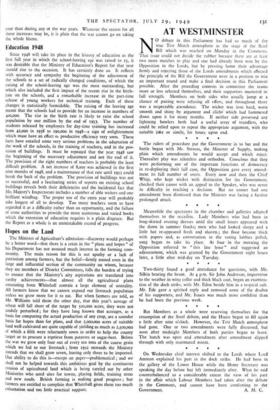Education 1948
Since 1948 will take its place in the history of education as the first full year in which the school-leaving age was raised to 15, it was desirable that the Ministry of Education's Report for that year should rise to the occasion. It has certainly done so. It reflects with accuracy and sympathy the beginning of the adjustment of the schools to a set of radically changed conditions, of which the raising of the school-leaving age was the most outstanding, but which also included the first impact of the recent rise in the birth- rate on the schools, and a remarkable increase in the part-time release of young workers for technical training. Each of these changes is statistically formidable. The raising of the leaving age meant that the schools had to provide for an increase in numbers of 403,000. The rise in the birth rate is likely to raise the school population by one million by the end of 1953. The number of students released by employers for day-time training has increased from 42,000 in 1938 to 190,000 in 1948—a sign of enlightenment which must have an effect oi productive efficiency very soon. These facts have entailed some very serious problems in the adaptation of the work of the schools, in the training of teachers, and in the pro- vision of buildings. It must be repeated that the year 1948 saw the beginning of the necessary adjustment and not the end of it. The provision of the right numbers of teachers is probably the least difficult problem. A net increase of 8,000 was achieved in the first nine months of 1948, and a maintenance of that rate until 1953 could break the back of the problem. The provision of buildings was not so successful, and a fascinating series of reports on existing school buildings reveals both their deficiencies and the incidental fact that His Majesty's Inspectorate includes a number of able writers and one brilliant windbag. The proper use of the extra year will probably take longest of all to develop. Too many teachers seem to have regarded it as a difficulty rather than an opportunity, and the failure of some authorities to provide the more numerous and varied books which the extension of education requires is a plain disgrace. But the Report as a whole is an unmistakable record of progress.


































 Previous page
Previous page